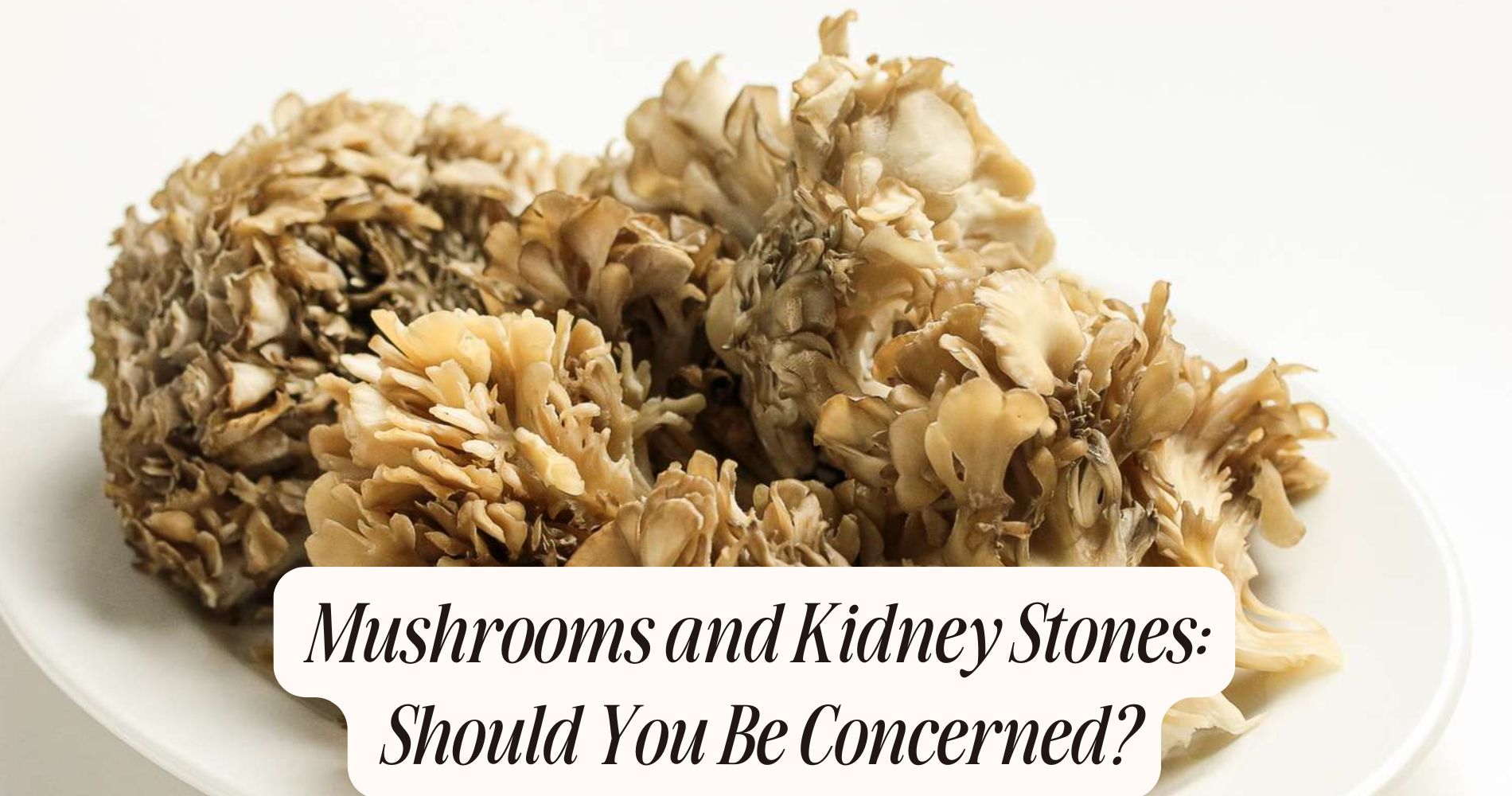
Mushrooms and Kidney Stones: Should You Be Concerned?
When it comes to mushrooms and kidney stones, it’s important to know how these fungi may impact your renal health. While mushrooms are nutrient-rich—offering low sodium, high B vitamins, and antioxidants—they also contain oxalates and purines, which can contribute to stone formation in some individuals. Specifically, calcium oxalate and uric acid stones may be influenced by excess consumption. To stay on the safe side, choose low-oxalate options like shiitake and always cook them to reduce oxalate levels. Smart choices can help you enjoy mushrooms without compromising your kidney health.
The Basics of Kidney Stones
Kidney stones, solid concretions formed from minerals and salts within the kidneys, are a common urological condition affecting many individuals. You might wonder how they develop.
Stone formation occurs when your kidney function is disrupted, leading to urine becoming supersaturated with crystallizing substances like calcium, oxalate, or uric acid. This imbalance can cause these substances to coalesce into hard deposits.
Your kidneys play an essential role in filtering waste from your bloodstream, maintaining homeostasis. When they don't function efficiently, the risk of stone formation increases.
These stones can vary in size and, if not managed, may obstruct the urinary tract, causing pain and potential damage. Understanding kidney stone basics helps in identifying symptoms early and seeking proper medical intervention.
Nutritional Profile of Mushrooms
Understanding the factors that influence kidney stone formation leads us to examine dietary components, such as mushrooms, which play an essential role in overall kidney health.
Mushrooms, with their diverse mushroom varieties, offer significant nutritional benefits. You'll find they're rich in essential nutrients like B vitamins, selenium, and potassium, which are critical for metabolic processes. These nutrients support various bodily functions, including maintaining fluid balance, which is important for kidney health.
Different mushroom varieties, such as shiitake, portobello, and white button, provide unique nutrient profiles, but they all share low sodium and high fiber content. This fiber aids in digestion, potentially reducing kidney stone risk factors.

How Mushrooms Might Affect Kidney Health
While mushrooms are often celebrated for their nutritional benefits, their specific impact on kidney health warrants a closer examination. Different mushroom varieties possess unique compositions that might influence kidney function in distinct ways.
For instance, mushrooms are generally low in sodium, which can be beneficial for maintaining healthy blood pressure—a factor indirectly supporting kidney health. Additionally, they contain essential nutrients like vitamin D and selenium, which play roles in cellular repair and antioxidant defense.
However, some mushroom varieties also have purines that metabolize into uric acid, potentially stressing kidney function in susceptible individuals. As a result, understanding the precise role of various nutrients in mushrooms, alongside individual dietary needs, is vital for ensuring ideal kidney health while enjoying their culinary versatility.
Oxalates in Mushrooms: A Key Consideration
As you consider the complex relationship between mushrooms and kidney health, oxalates emerge as an important factor to address.
Mushrooms, among other oxalate sources, can influence calcium oxalate stone formation, a primary type of kidney stone. Managing oxalate intake is essential for maintaining dietary balance, especially if you're prone to kidney stones.
Oxalates bind with calcium in the kidneys, potentially leading to stone formation. Consequently, monitoring oxalate consumption from various food sources, including mushrooms, is critical.
Comparing Different Types of Mushrooms
When comparing different types of mushrooms, it's essential to examine their nutritional profiles, particularly their oxalate content. Edible varieties like white button, shiitake, and oyster mushrooms generally contain lower oxalate levels, making them suitable for a kidney-conscious diet.
However, not all mushrooms are created equal. For instance, portobello mushrooms tend to have slightly higher oxalate concentrations.

Beyond nutritional content, consider the medicinal benefits. Shiitake mushrooms are renowned for their immune-boosting properties, while reishi mushrooms are celebrated for promoting relaxation and longevity.
These factors are significant when selecting mushrooms for both culinary and health purposes.
Tips for Including Mushrooms in a Kidney-Friendly Diet
Incorporating mushrooms into a kidney-friendly diet requires careful consideration of their oxalate content and preparation methods.
Begin by selecting low-oxalate mushroom varieties like shiitake or button mushrooms. These types generally contain fewer oxalates, reducing the risk of kidney stone formation.
When preparing mushrooms, opt for cooking methods such as boiling or steaming. These techniques can help lower oxalate levels, making them safer for consumption. Avoid raw mushrooms, as they may retain higher oxalate levels.
Additionally, maintain portion control; moderate consumption is essential. Integrate mushrooms into meals by combining them with other low-oxalate foods, creating balanced, kidney-friendly dishes.
Scientific Studies on Mushrooms and Kidney Stones
Although research on the direct relationship between mushrooms and kidney stones is limited, several studies provide insights into their nutritional components and effects on kidney health.
Mushroom varieties like shiitake and maitake are rich in nutrients, including vitamin D and antioxidants, which may support kidney function. These components play a role in kidney stone prevention by promoting better urinary health and reducing oxidative stress.

Some studies suggest that certain mushroom varieties might help lower oxalate levels, which are associated with kidney stone formation. By incorporating these mushrooms into your diet, you might enhance your body's capacity to manage mineral balance, essential for preventing stones.
While definitive conclusions are yet to be drawn, the current findings highlight potential benefits of mushrooms in supporting kidney health.
Expert Recommendations and Dietary Guidelines
While the direct link between mushrooms and kidney stone prevention is still under investigation, experts recommend a balanced diet that includes mushrooms as part of an overall strategy for kidney health.
Mushrooms provide essential nutrients and antioxidants, offering health benefits without contributing notably to dietary restrictions. They're low in oxalates, compounds often associated with kidney stone formation, making them a suitable option for those cautious about oxalate intake.
Including mushrooms can enhance your diet's nutritional profile, supporting kidney function and reducing the risk of stone formation. To optimize benefits, pair mushrooms with other low-oxalate foods and maintain adequate hydration.
Consulting a healthcare professional guarantees that your specific dietary needs align with these general guidelines for kidney health.
Try the Smarter Way to Enjoy Mushrooms
If you're exploring mushrooms for their health benefits but want a more convenient option than cooking, meet SUPER MUSHROOM GUMMIES by Well Gummies. These chewable vegan gummies pack the power of 10 functional mushrooms into a delicious wild berry treat. Designed to support immune health, mental clarity, and sustained energy—without jitters or crashes—our gummies make it easy to fuel your body and mind every day. No prep, no mess—just pop, chew, and shine all day.
Frequently Asked Questions
Can Cooking Methods Impact Mushrooms' Effect on Kidney Stones?
You should consider cooking techniques, as they can alter mushrooms' nutritional value. Some methods might reduce compounds that affect kidney stones, while others might not. Analyzing these methods' impact precisely helps manage dietary concerns effectively.
Are There Any Symptoms of Mushroom-Related Kidney Issues?
You should monitor symptom identification closely if you're worried about mushroom-related kidney issues. Look for signs like pain in your back or side, blood in urine, or frequent urination, as these can impact kidney health considerably.
Do Medicinal Mushrooms Differ in Their Effect on Kidney Stones?
You're exploring if medicinal mushrooms differ in their effect on kidney stones. Mushroom varieties possess distinct medicinal properties that could influence kidney health. Investigate each type's composition and effects to understand their potential impact on kidney stones.
Can Mushroom Supplements Contribute to Kidney Stone Formation?
You should analyze different mushroom types and their compounds. While most supplements are safe, always consider their oxalate content, which can contribute to kidney stone formation. Consult healthcare professionals to guarantee supplement safety in your personal context.
Are There Any Specific Mushrooms to Avoid With Existing Kidney Conditions?
You should examine mushroom toxicity concerns and adhere to dietary guidelines if you have existing kidney conditions. Certain mushrooms might exacerbate issues, so consult a healthcare professional for personalized advice tailored to your specific health needs.
Conclusion
You should consider the oxalate content in mushrooms when managing kidney stone risk. While mushrooms are nutritious, certain types might contribute to stone formation due to their oxalates. Choose mushrooms with lower oxalate levels, like shiitakes, and consume them in moderation. Incorporate them into a balanced, kidney-friendly diet by following expert dietary guidelines. Always consult healthcare professionals for personalized advice, as individual responses to dietary oxalates can vary greatly.




